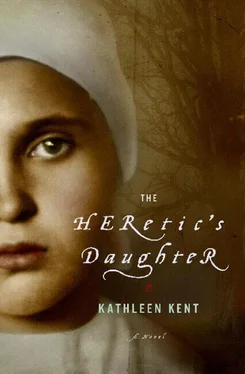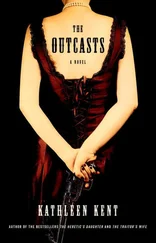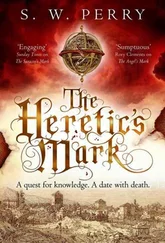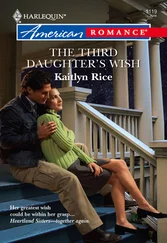That first evening at supper I sat in our far corner with Hannah heavy on my lap. The meat was so tough I had to chew it well to a pulp before placing small bits of it between my sister’s lips. She yet had few teeth, and Aunt was out of practice making mash for a baby’s mouth. The squash was well baked and Hannah sucked happily on a piece of it, the grease sliding down her hand onto my apron. Uncle had paused in his meal and, pushing his chair back from the table, stretched out his legs. Henry looked with slanted eyes over his shoulder at me before saying, “Tell us the story of the wandering soldier’s ghost, Father.”
“Oh, no, Roger. It is too late for such as that,” said Aunt, her mouth turning down at the corners. She caught Henry taunting me with an ugly face and pinched his hand. Uncle sat looking at me beneath heavy lids, the grease on his mouth and chin glistening orange and yellow in the light of the fire. It gave him the look of someone baked in a furnace. Margaret had turned to look at me as well, her dark hair making a curtain over her face. But the tense arch of her neck like a strung bow signaled to me, Do not hesitate. So I spoke out, “I am not afraid. Tell your story.”
Uncle slid his arm around Margaret’s shoulders and said, “It seems you have a companion spirit in your cousin Sarah.” He pushed his plate away and looked at the grain of the wood on the table as though a map had been spread in front of him.
“In the lowering twilight around some lonely and isolated village, much like Billerica, the dark gathers and gathers until the only light to the living comes from a few early-evening stars overhead. The light of a candle casts feeble shadows around a windowsill. The very air about the village fills with the terror of some yet unseen presence, the terror flowing like some rippling fog about the houses, the pastorage, the burial grounds. Soon every tree with its shattered limbs appears like some armed enemy. Every stump, a ravenous devourer.
“A thin and bony soldier appears from out of the purpled forests of oak and elm. He is dressed in torn and wretched clothing, wrapped in gory linen from ghastly wounds, going doorstep to doorstep through the village, begging something to eat. The only words he whispers at every door are ‘Hungry, so very hungry.’ A kindhearted woman hears his piteous pleas and returns with a plate of food, but he has disappeared from sight. Then, before going to bed, some foolish parent forgets to bolt and lock a door. A child, a redheaded child, who happens to be nine years old, like Sarah, wanders from the house carrying a sweetmeat for the brave soldier. In the morning the alert is sounded. The child is missing. After searching, the men in the village find only a shoe torn with sharp and jagged teeth, part of a petticoat matted and bloody, and a skein of bright red hair. Nothing more is ever found of the girl and it is many years before the hungry ghost is heard from again.”
I had grown up hearing the lusterless warnings of old women to shy away from glens and bogs after dark, as these low places are known to be visited by spirits of the dead. But the pitch of my uncle’s voice had been a kind of music. Not the dull, confining songs of the meetinghouse but a music both musky and dark. His words created a weighty tension in my chest as if I were a small fish hooked through the breastbone and pulled against the current of some unnatural course onto a strange and dangerous shore. The rude and simple furnishings of the room seemed richer. The warmth of the fire and the cinders stirred up from the fire were like a golden wool. The little black panes of window glass had turned to garnets and topazes in a giant’s ear. Hannah began to protest and struggle against my clasped hands and I let her slip to the ground, saying, “Why would the hungry ghost eat a child when offered village food?”
“Why, indeed,” replied Uncle, laughing. “To question shows an active mind. But be careful, it is sometimes better not to ask, and be satisfied with a tale well told. Especially if you value the good opinion of the teller.” He said the last in all seriousness but he winked at me and I felt as though his arms had embraced me.
Later, as I lay on my pallet, the rise and fall of Uncle’s voice was fixed in my head, though he had long since gone to bed. I would sleep deeply and well through the night, but the cup of my imagination was not yet filled, for the next night my dreams would keep time with demons.
THE SECOND DAY I felt idle and cross with nothing useful to do and I wanted very much to open one of the small, leaded-glass windows and toss Hannah out into the snow. The only respite came after supper, when Uncle told of his adventures in King Philip’s War, and then only after we had begged and begged him to tell it.
“King Philip,” he said as he moved round closer to the fire, “was the English name given to Metacom, chief of the Pokanoket tribe. This chief was proud and haughty and believed he could drive out the English settlers. The war began in a village near Bristol in ’seventy-five. Indians had butchered a settler’s cow and the settlers followed by killing an Indian. The Indians then revenged themselves by knocking over the head the farmers and their families, and so began a trail of murder that would destroy settlements for hundreds of miles.” He ticked off the names of invading Indian tribes, sounding like a shuttlecock striking a wooden weaver’s frame.
“Nipmucks, Wampanoags, and Pokanokets all began raiding villages and homesteads in the territories of Rhode Island and Connecticut and Massachusetts. A thousand men assembled by General Winslow marched as neat as you please into Indian territory, and it was with this group of men that I served as an officer’s surgeon. A Narragansett camp was soon discovered in the woods by advanced scouts. Now, it’s true that the Narragansetts had been a peaceable tribe until that time, but their great numbers caused the New Englanders much unease and it would only be a matter of time before they roused themselves to join their dark brothers. So, in the early dawn hours, a tree was felled over a stream and our forces swarmed quickly into their camp.
“The killing was swift and complete. Every last Narragansett brave in the camp was packed off to hell. By nightfall the ground was so slippery from the bloody matter of the shootings and the knifings that man and beast alike could not stand upright on the snow. I myself killed six or seven before the day was complete. The marvel was how easily they were dispatched. We placed their heads on pikes and left them in the ground to give fair warning to the other tribes.” He stopped for a moment to light his pipe with a taper pulled from the hearth. His exhaled breath sent smoke from his nose down his cheeks, and he pitched a ragged, suffering note to his storytelling.
“A certain Captain Gardner had been mortally wounded in the head and chest during the battle and would allow no other physician but I to attend him. Blood ran down his face in rivers where his skin had peeled away from his skull like a soft-boiled chestnut. I lifted him up and called him by name. ‘Captain Gardner, Captain Gardner, can you hear me?’ He looked up at me, his life force flowing out of his veins, and thanked me for my service. He died in my arms. We carried him back to Boston, where he was buried with all due honors.”
We all sat in silence and watched the firelight on white birch form dancing pictures of massacres in the snow. Henry then said, “Father, show us the scar from the battle.”
Aunt frowned at this, but Uncle cheerfully opened his coat and shirt to reveal an angry scar that cut downward across his chest, just under the left nipple, to the tender part of his belly. As he tamped out the remaining embers of his pipe, he said in closing, “Only a year ago during the coldest months were Schenectady to Salmon Falls to Falmouth attacked by the French and Indians. Hundreds were killed and captives taken. Women with child ripped open, their babes dashed on the rocks. People think that the winter season forbids the stirring about of the Indian” — and here he looked up at me — “but it seems the snow and cold does not keep them from our door.”
Читать дальше












